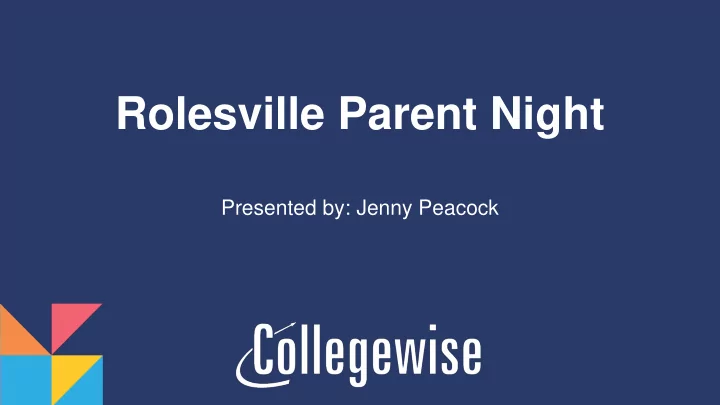

Rolesville Parent Night Presented by: Jenny Peacock
Who are we? Jenny Peacock Director of Counseling • 12 years of admissions experience • Three years at Collegewise Laura Dicas College Counselor • 12 years of college admissions experience • Six years of college counseling experience
ACT vs SAT
General Format and Scoring Change SAT ACT 1. Math 1. Math 2. Evidence-Based Reading and Writing 2. Reading 3. English SECTIONS 4. Science *Optional essay not included in other scores *Optional writing test • • Composite score out of 1600 Composite score (1 – 36) • 200 – 800 for each of the 2 Areas • Test scores in English, Math, Reading and Science (1 – 36 each) New sub-scoring within each test and SCORING across the entire exam. *Essay scored separately; not required. *Essay scored separately; not required.
Timing Change SAT ACT Math Math • 1 (60 minutes) • 1 (Calculator allowed – 55 minutes) Reading • 1 (No Calculator – 20 minutes) • 1 (35 minutes) Reading English • 1 (65 minutes) • 1 (45 minutes) Writing & Language Science • 1 (35 minutes) • 1 (35 minutes) TIMING Essay (optional) Essay (optional) • 1 (50 minutes) • 1 (30 minutes) Total Time: 3 hours Total Time: 3 hours Total Time with Essay: 3 hours, 30 Total Time with Essay: 3 hours, 50 minutes minutes
Answers Change SAT ACT ANSWER CHOICES 4 answer choices per question 4 answer choices per question INCORRECT ANSWER No penalty for incorrect No penalty for incorrect answers PENALTY answers
Big Picture More advanced and complex on SAT including more Grid-In (not multiple choice) questions Less vocabulary on SAT, but more charts, graphs and references to historical documents More grammar on SAT and tested in passages. Optional essay doesn’t count toward Composite score. Fewer choices on SAT is easier No penalty for wrong answers makes it easier to guess Is the SAT as coachable as the ACT? Yes! Deciding between ACT and SAT? • Like higher order math? -> SAT. • Do better with language than math? -> ACT.
ACT Tips Letter of the day! English Section 6 Comma Rules (ie: Oxford comma) Math Section -Pre-Algebra vocabulary and math concept are important (1/3 of exam) -Memorize formulas -Only 4 Trig problems on the whole exam Reading Section -If you are worried about time only tackle 3 of the 4 reading sections -Dual reading passage Science Section -There is no science! -Just pay attention to the charts and graphs -Do not read the corresponding passages-they are designed to steal your time
SAT Tips • Letter of the day! • Guess...if you can eliminate at least one choice. • Learn the section directions now. Use time saved to work on questions. • Know the Question Types to Expect on the SAT I: the SAT consists of a series of small, timed, mini-tests. Keep track of the time you're allotted for each one and how much time remains. * 19 sentence completion * 40 reading comprehension * 35 math multiple-choices * 10 student-produced responses • Answer easy questions first. Mark skipped questions in your exam book so you can quickly return to them later. • You can write in the test book: cross out wrong answers; do scratch work. • Take care when filling in the answer grid for the student-produced response questions. • Easy questions usually precede hard ones. • Remember that Read the words in the question carefully. Be sure to answer the question asked and not the question you recall from a practice test.
What’s a Good Score? Colleges Average ACT Average SAT University of North Carolina-Chapel Hill 28-32 1320-1470 North Carolina State University 26-30 1260-1400 Appalachian State University 23-27 1140-1290 East Carolina University 20-24 1030-1180 University of North Carolina at Asheville 24-28 1180-1320 University of North Carolina at Charlotte 21-25 1070-1220 Duke University 31-34 1430-1540
Testing Timeline Early Action Application Season: October-December 1 Regular Decision Application Season: January Highly Selective Colleges: Complete standardized testing (SAT/ACT) in March SAT 2/ Subject Test in May or June Junior Year Moderately Selective Colleges: Complete standardized testing (SAT/ACT) in June Junior Year Last Chance August or September Senior Year
What Happens If I Don’t Do Well? • Test Optional Colleges • Over 900 Colleges • Great Colleges: Wake Forest University • New Colleges Join Each Fall • FairTest.Org
How can Collegewise help? 1. Check out our blog and get free resources at collegewise.com Read our founder’s blog at wiselikeus.com 2. 3. Subscribe to receive our newsletter, updates, and upcoming seminars. 4. Sign up for a free 30-Minute introductory meeting with a counselor.
Jenny Peacock JennyP@collegewise.com • (919) 443 -0829 collegewise.com
Recommend
More recommend